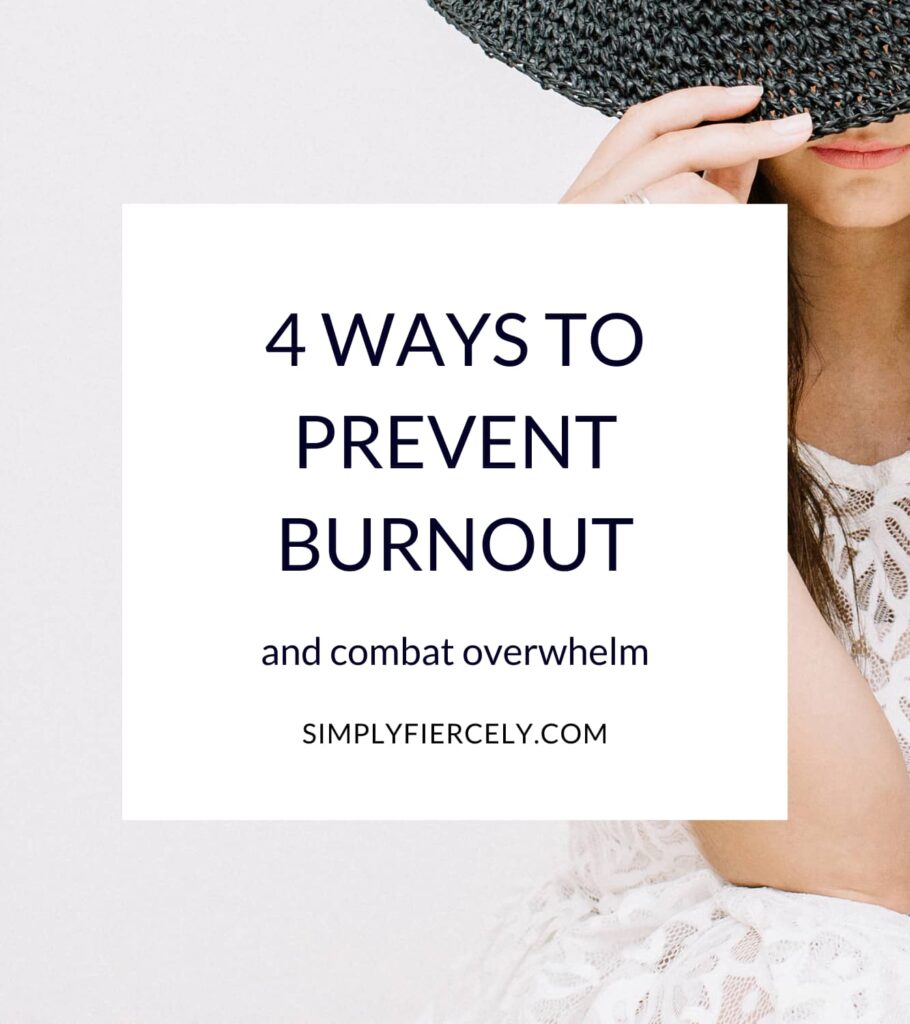Tell me—does any of the following sound familiar? You’re overwhelmed and exhausted, you daydream about running away to a deserted island, or you’re snapping at loved ones for no apparent reason.
If so, welcome to the burnout danger zone, my friend.
It’s a grey area where, unfortunately, I think too many women spend a lot of time. I was burnt out for much of my twenties. It’s what happens when you’re trying to do all the things—but if you catch it early enough, there are healthy ways to identify and avoid burnout.
If you’re starting to feel yourself slip, now is the time to intervene and find balance in your life again. Keep reading for practical ways to prevent burnout, as well as how to recognise when you need help.

This post contains affiliate links, which means I recommend products and make a small commission on purchases at no additional cost to you. Click here for the full disclosure statement.
What Is Burnout + What Are The Symptoms
If you think you might be struggling, here are some of the most common burnout symptoms to look out for:
Exhaustion: this goes a little further than just a lack of sleep. It may not matter if you’re getting your full eight hours every night, you’ll still wake up feeling physically and emotionally depleted.
Isolation: exhaustion and overwhelm can lead us to withdraw from our loved ones. If you’re starting to find spending time with friends, family, and co-workers draining instead of enjoyable, you might begin to isolate yourself as a result.
Escape fantasies: this sign is probably relatable for all of us now and then, but if you’re feeling dissatisfied with your job or your life more broadly, then you might begin to fantasise about running away or taking a long holiday alone. This symptom may also cause people to turn to more unhealthy means of escapism.
On a personal note, this is something I really struggled with. I daydreamed about travel ALL the time, and when physically running away wasn’t possible, I would use excessive shopping to buffer my emotions. Of course, compulsive shopping left me in debt, which then drove me to work even harder. It was a vicious cycle that left me completely drained.
Irritability: If you find that the little things are always bothering you, then it’s a good sign that something’s not right.
Overwhelm: life is stressful at the best of times, but burnout can cause you to feel that your routine work tasks, taking care of children, and doing household chores are impossible, especially when things don’t go the way you want them to.

One thing worth mentioning is that it can be hard to recognise these symptoms when you’re in the thick of life. Many of us have been conditioned to think that complete overwhelm is a normal part of “adulting”. Instead of asking for help or consciously slowing down, we respond to stress by working even harder.
If this resonates with you, then I invite you to consider a quote I’ve seen floating around: “A friendly reminder that “doing your best” does not mean working yourself to the point of a mental breakdown.” I’ve been unable to find a source, but I’m sharing it anyway because I think it’s something far too many women need to be reminded of.
How to Prevent Burnout
If you think you might be at risk for burnout, you need to take action now. Be kind to yourself and take steps to combat the overwhelm. Here are a few ideas to try.
Choose your battles
The first step to avoiding burnout is admitting that we can’t do everything.
It feels a bit silly to write that—of course, we can’t do everything—but do you really believe it? Or perhaps, more importantly, do your ACTIONS reflect this belief? Are you being intentional and making decisions in alignment with your life priorities? Or are you trying to please everyone, and chasing impossible standards of perfection?
You might be keeping all your balls in the air for now, but eventually, something’s got to give. Be intentional about what to walk away from before you have no choice, and your health and wellbeing suffer.
Related Post: How to Say No Without Feeling Guilty In 5 Simple Steps
Take up a creative hobby
Now, I know what you’re thinking: “I don’t have enough time.” And I get it. I know that when you’re busy, making time for yourself to do hobbies seems the last possible thing you should be doing.
But sometimes in life, you have to slow down to speed up. Being creative fills our soul—and if you don’t believe me, think about the little ones in your life and their endless energy. Research shows that imaginative play can boost our energy levels too.
If you’re not sure where to begin, think back to your childhood and teen years. Most of us had creative outlets like playing music, writing bad poetry, or visual art to express ourselves. Try bringing it back, or pick up something new if you don’t think that writing Harry Potter fanfiction will fulfil you as much as it used to.
Also, keep in mind that it doesn’t have to be a huge time commitment. One of my favourite creative outlets is journaling, and I often find that taking even a quick 15 minutes to write restores my energy.
Get the support you need
I know that asking for help is not easy. It goes back to that rugged individualism that many of us were exposed to growing up. In a culture that celebrates people who pull themselves up by their bootstraps, asking for help can feel like a sign of failure.
I felt this way for the first 30 years of my life. Even as a teenager, I was always trying to prove myself. I would work at a local restaurant until 2 am on school nights because I didn’t want to ask for help. Instead, I had to show that I could do it all myself.
It’s a pattern that repeated over the years, and I was so proud of my independence …but at what cost? Looking back, there’s so much that I missed out on, and in truth, I’m lucky that I was able to turn things around. I wasted so many nights feeling completely hopeless and exhausted, and I know now that it didn’t have to be that way.
It’s OK to ask for help—from family, friends, co-workers or even professionals. You don’t have to carry the heavy burden of modern life alone. Of course, I’m aware that some people don’t have a village that they can fall back on. Still, keep your eyes open for opportunities, and when you see one, say yes to the support you need.

Make peace with “good enough”
Growing up, I was taught to put 100% into everything I did. No—scratch that. I was taught to put 110% into everything I did. It was about giving my all and doing the best possible job, no matter what.
But what happens when you’re always operating at your maximum capacity? If you’re always giving everything away, what’s left for yourself?
Not much—which is why, as I’ve gotten older, I’ve come to accept that my time and energy are precious resources. Not everything deserves my best, and that’s OK. Instead of giving my all, I take a completely different approach by asking myself: “What’s the minimum I need to do to achieve the outcome that I want?”
I’m still committed to my best work for some things, but other times, good enough is good enough. This means that sometimes I can’t be bothered to fold my laundry (there’s no KonMari in this house) and I rarely achieve inbox zero. Some of my blog posts have typos and please—don’t look too closely at my unplucked eyebrows.
I’ve embraced imperfection, and I’ll admit that I’m not always happy about this. But when I’m struggling, I remind myself that doing a mediocre job with things like housework means I can show up fully for my children, my husband, and myself.
Feeling Burnt Out? (Further Reading + Resources)
Ultimately, burnout is complicated. There are so many things outside of our control that can cause stress and overwhelm, and it’s frustrating. But when times get tough, I remind myself to look inward.
What is within my sphere of influence? Are there any tiny changes I can make to improve my situation? Sometimes there are practical things I can do, but more often, it’s a mindset switch. Slowly and steadily, these choices help me find balance and hopefully, they help you too.
If you’d like to learn more, here are a collection of blog posts and other resources that might help you:
- Finding the Balance Between Rest + Hustle – a personal essay about knowing when to work harder and when to seek rest.
- 9 Actionable Ways To Declutter Your Schedule and Be Less Busy
- Doing Less + A Lesson in Self-Worth – if the thought of slowing down makes you anxious, you’re not alone.
- How to Live In The Present (4 Simple Mindfulness Tips) – mindfulness can be a powerful tool when you’re struggling with burnout.
- Emotional Agility: Get Unstuck, Embrace Change, and Thrive in Work and Life by Dr. Susan David – a life-changing book about navigating life with compassion and courage. Highly recommended!
- 7 Simple Days – a mini-course that has helped over 2,500 Simplify + Fiercely readers clarify their priorities and simplify their lives.
On a final note: I want to mention that burnout symptoms can mirror the symptoms of depression. Please have a chat with a professional if you aren’t coping.
Have you ever struggled with burnout? If so, what tools helped you turn things around? Let us know in the comments!


I had a job where things could blow up, catch fire or leak toxic chemicals. I also had hundreds of employees I was responsible for. I was on call 24x7x365 for decades. Yet it was a lot of fun! I ran five or ten miles every other morning and played tennis in the evenings. That physical workout took the stress away. I had a loving spouse who chose to be a stay at home mom and home was a safe and warm place for us and our three kids. And work was a place full of laughter, we genuinely liked each other and had a lot of fun. So I never even came close to burning out. I think having so many friends at work, my family and all the hard physical exercise were the keys to surviving the stress.